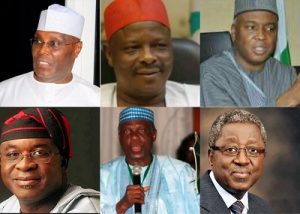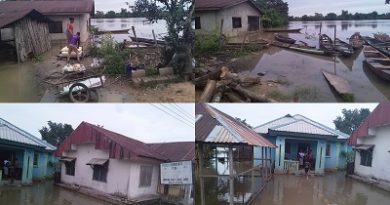PDP’s Choice Of A Presidential Candidate May Make Nonsense Of HSBC’s Confidential Business Report Of A Buhari 2019 Election Loss


The Oasis Reporters
September 17, 2018

Bottom (left to right): David Mark, Jerry Gana, David Jang.
Despite the furious reaction of Nigeria’s President Muhammadu Buhari to the confidential business intelligence report issued by British multinational bank, HSBC, predicting that reelecting President Muhammadu Buhari in 2019 could plunge Nigeria into deeper economic hardship, a Buhari loss is principally predicated on who the biggest opposition party and former ruling party, the People’s Democratic Party, PDP chooses as it’s presidential candidate in 2019 first quarter election billed to commence in February in a July report recently cited by the Nigerian media, the bank had said a second term for Mr Buhari would greatly stunt the economic development of the country.
In a statement Saturday, the Presidency accused the bank of thriving on “grand corruption” and helping past and present Nigerian leaders launder billions of naira.
The surprise in the reaction of the presidency is the tacit admission that late Gen. Sani Abacha did help himself liberally to Nigeria’s collective patrimony. A position that President Buhari who served in the Abacha administration was quoted as saying that Abacha did not steal, when he was in the opposition.
Ordinarily, the HSBC rested on facts and feelings of Nigerians putting into consideration the largely unfulfilled economic expectations and disappointing security situation in the country, especially in the Middle belt region who are mostly of minority tribes and predominantly Christian, as well as in the north west Hausa state of Zamfara.
Currently, the front line candidates of the former ruling but now opposition People’s Democratic Party, PDP appear to be former Kano State governor, Rabiu Musa Kwankwaso, former governor of Kwara State and current Senate President, Bukola Saraki and former Vice president Atiku Abubakar. The three gentlemen were once People’s Democratic Party chieftains who pulled out to join Buhari’s All Progressive Congress, APC while ensuring that then President Goodluck Jonathan lost the 2015 election to Mr. Buhari. They’ve fallen out with president Buhari and have gone back to their original party, the PDP. Not every party member seems enamoured with their comeback bid but the bid to defeat Buhari is what is producing the toothpaste smile for them. Besides the trio are perceived to be projecting the Fulani agenda which is the same ethnic group with President Buhari. And Nigerians have become wary of the tribe in political circles as they seem to always corner almost all top political appointments that come to the north to the discomfiture of the other tribes numbering over 250 in northern Nigeria.
Although the PDP has zoned the presidency to the north, Nigerians note that each time there’s a political contest, the Fulani tribe alone gets considered and it has become glaring that it is quite possible to pursue a one tribe agenda that can be ruinous to the other tribes.
Therefore the Middle belt group which is largely Christian, facing ethnic cleansing by terrorists largely suspected to be Fulani herdsmen militia that often share videos of their murderous exploits in the region are now asserting their rights to leadership more so when they recall that in the first republic, the Premier of the Northern region, Sir Ahmadu Bello was Fulani Muslim. In the Second Republic, another Fulani Muslim, Shehu Shagari emerged as president from the north. The Third Republic saw two northern Fulani candidates, Umaru Musa Yar’adua and Muhammadu Buhari who contested basically as northern representatives.
So the question Middle belt opinion voices are asking is whether it should be another Fulani Muslim versus Fulani Muslim contest again?
Where does that leave the North central middle belt? They have therefore come out by defying intimidation and asserting their rights to a fair and equitable contest with candidates like the former Senate President David Mark, former Plateau State Governor David Jonah Jang and former Minister Prof. Jerry Gana, who has already crossed over to the Social Democratic Party, SDP.
The middle belt candidates may not get the PDP ticket as they seem not to be as rich and influential as their Fulani Muslim counterparts. The fall out would be that any of the aforementioned three Fulani candidates would run against Muhammadu Buhari. The choice would be a difficult one for Nigerians owing to Buhari’s perceived ineptitude in handling security and government affairs especially as under him, inflation rose dramatically and 95% of Nigerians slipped into earning less than $5.5 a day with several millions out of work.
But a Buhari win would mean another four years. Any win by the other Fulani candidates might give the tribe and the north, another 8 years, long enough to implement any agenda. With the recent security breaches in the Middle belt, there remains palpable fear amongst the populace because they all trusted Buhari in 2015 and notice what they are getting now.
On the other hand, a party like the All Progressive Grand Alliance, APGA of the largely South east Igbo tribe might emerge from the shadows after the PDP primaries and hand their ticket to any Christian Middle belt candidate as appreciation for Solomon Lar’s alignment with Nnamdi Azikiwe in the old NPP Igbo party. That would energize the electorate especially in the south like the Rev. Fr. Aristide’s sudden candidature which propelled Haitians to register, vote and remove the country’s crippling Duvalier oligarchy. a few decades ago.
Like it happened too in France, with an unusual Emmanuel Macron emerging to send the centuries old political parties into oblivion.
The likelihood of the entire south rising in solidarity with the Middle belt is ever present. The main theme of solving the Middle belt security challenge as encapsulated in the presidential bid of former Ondo state governor, Olusegun Mimiko on the platform of the Labour Party best portrays the deep passion the south holds on the topic.
A collaboration between the south east, south west, south south with pockets in the north east and north west would simply be unbeatable.
For the records, here’s the full statement signed by presidential spokesperson Garba Shehu below:
PRESIDENCY WANTS HSBC TO RETURN OUR STOLEN ASSETS, NOT GIVE US DOOMSDAY PROPHECY ON 2019
The Presidency wishes to make clear to all Nigerians, and particularly the global banking giant HSBC which said the second term of President Muhammadu Buhari would stunt the economy, that what killed Nigeria’s economy in the past was the unbridled looting of state resources by leaders, the type which was actively supported by HSBC.
A bank that soiled its hand with ‘‘millions of US dollars yet-to-be-recovered Abacha loot’’, and continued until a few months ago to shield the stolen funds of one of the leaders of the Nigerian Senate has no moral right whatsoever to project that a “second term for Mr. Buhari raises the risk of limited economic progress and further fiscal deterioration.”
Rather, we ask them to heed President Buhari’s constant refrain: return our stolen assets, then see how well we will do.
From the facts available to our investigation agencies, HSBC’s put down on President Buhari is no more than an expression of frustration over the administration’s measures put in place which has abolished grand corruption, the type which this bank thrives on in many countries.
They may also just be out to discredit the President out of the fear of sanctions and fines following the national assets that are stolen.
With the coming of President Buhari, it is not a secret that corruption, corrupt individuals, banks and other corporate entities that aided corrupt practices are under investigation for various offenses.
For many of them, including their friends in the media, they would rather have President Buhari out of their way, for business as usual to return.
Our investigation agencies believe that HSBC had laundered more than USD 100,000,000 for the late General Sani Abacha in Jersey, Paris, London and Geneva.
Among these accounts on the records are: AC: S-104460 HSBC Fund Admin Ltd. Jersey ($12,000,000); AC 37060762 HSBC Life (Europe), U.K ($20,000,000) and AC: 38175076 HSBC Bank Plc. U.K ($1,600,000).
The bank is also suspected in the laundering of proceeds of corruption involving more than 50 other Nigerians, including a serving Senator as earlier indicated.
In a book, “Secrecy World: Inside the Panama Papers Investigation”, published in 2017, Jack Bernstein told the story of global money laundering highlighting the unenviable place of the HSBC.
This is a bank that states and federal authorities in the U.S. forced to pay $1.92 billion to settle charges of money laundering; fined $1.2 billion in Hong Kong for “systemic deficiencies” in bond sales and was made to pay $100 million in currency rigging settlement as reported by The Telegraph of 18th January, 2018.
Garba Shehu
Senior Special Adviser to the President
(Media & Publicity)
September 15, 2018













